COP20—Lima Climate Conference
Author and Page information
- This page: https://www.globalissues.org/article/805/cop20-lima-climate-conference.
- To print all information (e.g. expanded side notes, shows alternative links), use the print version:
On this page:
Introduction
 December 1 – 14, 2014, Lima, Peru was the venue for the 20th annual United Nations Climate Change Conference, also known as the 20th Conference of the Parties — or COP 20.
December 1 – 14, 2014, Lima, Peru was the venue for the 20th annual United Nations Climate Change Conference, also known as the 20th Conference of the Parties — or COP 20.
The purpose of this conference was to create a universal agreement on climate change action and begin the process of financing mitigation.
Meeting outcome
The meeting ended with all nations agreeing to cut back greenhouse gas emissions. Known as the Lima Accord, this treaty is not legally binding and countries do not have to specify how much they will cut back, instead agreeing to report their plans back by March 2015.
While for many it sounded like a successful outcome, others were disappointed, such as poor countries struggling to rebuild from current impacts of climate change who were alarmed at the disappearance of loss and damage commitments from the final text which has been part of the discussion for years.
The global climate movement, 350.org, summarized the disappointments and hopeful aspects of the meeting outcome, noting
- The new agreement does not reflect the urgency of the climate crisis
- Some good agreements – but no measures to ensure implementation
- Least developed and vulnerable nations left out in the cold
- Divestment (from fossil fuel reliance) is more important than ever
- Global momentum for real solutions is stronger than ever and will keep on going.
In trying to put a positive spin on the overall disappointment they felt, they concluded, In the end, a global climate treaty is just one tool to combat climate change. Real change is going to continue to come from the grassroots. The UN Climate Talks continue to be a place where the world’s countries comes together to debate this crisis and people are putting in enormous efforts to make sure Paris [the next global meeting] won’t be like Copenhagen
which was full of disappointments despite big promises.
Samantha Smith, Leader of WWF’s Global Climate and Energy Initiative, was quite scathing of the meeting outcome saying that political expediency won over scientific urgency
. She also noted that Developed country governments couldn’t even manage to explain how they will deliver the long-promised US$100 billion per year in climate finance by 2020. In a move that seemingly dismissed the plight of the most vulnerable countries, they completely removed any meaningful language about ‘loss and damage’.
Mainstream media reporting
As with almost every previous meeting (with occasional exceptions), mainstream media reporting was very poor given the importance of this global issue. Where the meeting was reported it was generally towards the end, and just sound bite type summaries saying all countries agreed to emission cuts and that this was a major improvement.
While the treaty continued to say it honors the long-standing common but differentiated responsibilities
the mainstream media reporting (as in most years) has typically failed to provide explanation and context of this principle that has been an important part of these talks for over 2 decades; that poor and developing countries should not bear the same responsibilities as the developed ones (because they are not the cause of the anthropogenic carbon emissions over the previous decades that have led to this, which is detailed much more on this site’s page on climate justice).
A hint towards this principle may have been presented as a viewpoint of China or India, given the impression they are being obstacles, rather then explaining this principle in more context.
That was just one of the issues skirted over or omitted from common reporting. Others included issues on financing, technology support for poorer nations, etc. Behind the scenes, for decades, rich countries have stalled on these things or actively avoided trying to share technology etc, which is barely reported.
Every year, this criticism is made of mainstream reporting, so without following these negotiations each year, it can be easy to come away with the impression that this meeting had a positive outcome.
But as this discussion hosted by Democracy Now! shows, there were a number of important issues of contention:
In context: common but differentiated responsibilities
Many years ago all nations agreed that climate change was largely the result of actions from today’s industrialized nations, as carbon dioxide — the main greenhouse gas — stays in the atmosphere for decades. Yet, the poorest would end up suffering the most for a problem they largely did not cause. The approaches to mitigation (emissions reduction) would therefore be different for those groups of countries — the common but differentiated responsibilities principle.
It is in this context that the discussion for loss and damage has come about. And it is something that rich countries are keen to get rid of .
The years of resistance on this issue (and many others) means each time it is discussed again the reactions seem to get even more hostile. Combined with the lack of detailed context in the mainstream media coverage of this aspect, it then becomes easier each time to see culprits as China and India given their enormous greenhouse emissions in recent years, compared to the far greater amount by the industrialized nations over the longer period. See this site’s section on climate justice for more detailed background.
And as this site has said for years on the climate justice page, the rich nations are delaying any meaningful action until it is eventually — and disproportionately — paid for the by the developing nations. New Delhi based Nitin Sethi, associate editor at Business Standard, interviewed in the earlier mentioned video says the same thing, but more frankly:
There is no action that’s going to happen between now and 2020. All of that was to be done by the developed countries. They [rich nations] basically have just said at Lima that
we are not going to do any more than what we’re doing so far, and the burden can shift onto the post-2020 era, where other developing countries have to share it.So, to me, it indicates really negotiation in bad faith.
More information
As the conference is still underway as this page is written, more information will be added here after the event is over.
For more about the issues from other organizations, here are some starting points:
News stories from IPS
Below is a list of stories from Inter Press Service related to the Lima climate conference and its aftermath.
Climate Crisis in Mountains: Borderless Struggle for Frontline Communities
- Inter Press Service
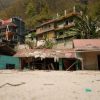
KATHMANDU, Nepal & SIKKIM, India, Apr 26 (IPS) - Climate change-induced flooding has devastated the lives of people living on the Indian and Nepalese sides of the Hindu Kush Himalaya. Although the floods have destroyed their lives and livelihoods, as this cross-border collaboration narrates, neither community has received any substantial compensation.For the last three years, Sambhunath Guragain has been waking up every morning to a view he doesn't want to see: discarded agricultural land where he and his family used to grow food, including rice, but the flood in 2021 changed everything.
AI Policy Can't Ignore Climate Change: We Need Net Zero AI Emissions
- Inter Press Service

WASHINGTON DC, Apr 25 (IPS) - Artificial intelligence provides amazing potential for advancement across fields, from medicine to agriculture to industry to the entertainment business, even as it generates significant concerns. AI can also improve the efficiency of energy production and use in ways that can reduce greenhouse gas emissions.
WMO report: Asia hit hardest by climate change and extreme weather
- UN News

Asia remained the world’s most disaster-affected region in 2023 due to weather, climate and water-related hazards. Storms and floods have hit the hardest, a new report published by the World Meteorological Organization (WMO) on Tuesday reveals.
UN chief calls for all hands on deck at Climate Promise 2025 launch
- UN News

Top UN officials launched a fresh global campaign to tackle the climate emergency on Tuesday, with social media influencers, Indigenous leaders and corporate giants showing what they’ve done and what’s to come.
Indigenous Kalinago lead the way towards making Dominica ‘climate resilient’
- UN News

Dominica aims to become the world’s first “climate-resilient nation, and the indigenous Kalinago people are playing a leading role in developing the country and helping its people to thrive in the face of the climate emergency.
Pioneering Digital Initiative Empowers Pacific Islands to Tackle Climate Disasters
- Inter Press Service

Apr 15 (IPS) - Winning a battle for survival requires understanding the opponent. And, for the peoples of 22 island nations and territories scattered across more than 155 million square kilometres of Pacific Ocean, the volatility and wrath of the climate are their greatest threats.
Fishers in Madagascar adapt to deadly seas due to climate change
- UN News

Fishing communities in the south of Madagascar are facing sometimes deadly sea conditions due to climate change, but with the help of the UN’s International Labour Organization (ILO) are finding ways to adapt to the new circumstances they face.
The Climate Alarm Is Ringing – It’s Time to Stop Silencing It
- Inter Press Service

LONDON, Apr 12 (IPS) - The heat records keep tumbling – 2023 was the hottest year in recorded history. Extreme weather events keep mounting up. And yet the voices most strongly calling for action to prevent climate catastrophe are increasingly being silenced.
Women Affected by Gender-Biased Climate Change Deserve Justice
- Inter Press Service
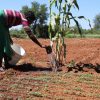
BULAWAYO, Apr 11 (IPS) - While research into the unequal impacts of climate change on women is growing, more is needed to enable them to realize their rights to climate justice.
The US Must Address More Than LNG To Mitigate Climate Change
- Inter Press Service

WASHINGTON DC, Apr 10 (IPS) - Earlier this year, the Biden administration paused action on pending approvals for U.S. liquefied natural gas exports to countries without a U.S. free-trade agreement, with President Biden citing ”the urgency of the climate crisis.” The decision was hailed by climate activists and criticized by oil and gas industry representatives.
To Mitigate Climate Change Associated Disasters That Impact the Agricultural Sector - Launch Multipronged Efforts
- Inter Press Service
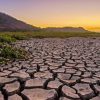
URBANA, Illinois, US, Apr 10 (IPS) - Recently, the United Nations in collaboration and the World Meteorological Organization released a report that highlighted the impacts of climate change including on agriculture.
Social Protection, a Key Solution for Directing Climate Finance To Poor Small-Scale Farmers
- Inter Press Service
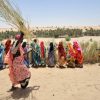
ROME, Apr 05 (IPS) - Climate change is exacerbating inequalities between and within countries, disproportionately affecting poor households in rural areas. In fact, we know that more than half of the resources of the poor – a large part of whom are small-scale farmers - are lost due to climatic hazards. This has negative impacts on the incomes of these people and their ability to meet their essential needs, including food.
Taking Charge: Three Actions to Help Combat Climate Change and Save Amazonia
- Inter Press Service
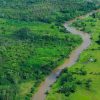
NEW YORK, Apr 04 (IPS) - Climate change is the defining crisis of our time––it is the ultimate equalizer from which no one is immune. The Earth's ecosystems are on the brink of collapsethreatening biodiversity and human societies in unprecedented ways at a global scale.
Climate Change: the Partnership with Asian & Pacific Small Island Developing States
- Inter Press Service

BANGKOK, Thailand, Apr 02 (IPS) - Stories of growing vulnerability make regular headlines across all Asian and Pacific small island developing States (SIDS). With tens of thousands of people displaced every year due to climate and disaster-related events, there are continued concerns about the costs of climate-related hazards.
The Impact of Climate Change on a Biodiversity Hot Spot
- Inter Press Service
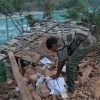
KATHMANDU, Nepal, Mar 29 (IPS) - If there is a place where the interlinkages and dependencies between the effects of climate warming and biodiversity loss are clearly at display, it’s Nepal. There is clear evidence on the impact of climate change on the country’s ecosystem considering the fact that Nepal is an important biodiversity hotspot.
Stories from the UN Archive: A seminal moment for youth climate action
- UN News

“What you do makes me cry at night,” 13-year-old Severn Cullis-Suzuki told the 1992 Earth Summit in Brazil in a message that resonates today as the world grapples with climate change.
Parents Harness Pedal and Wind Power To Demand Climate Action
- Inter Press Service

ROME, Mar 26 (IPS) - Extreme sports are not just for young people. Climate activism isn’t either. Yamandù Pagliano is proof.
Earth Hour: Lights off, climate action on
- UN News

The largest global environment movement is happening on Saturday, when the UN invites people around the world to shut the lights to remember the planetary crisis during Earth Hour as young partners find new ways to drive climate action.
How Women in Ahmedabad Slums Are Beating Back Climate’s Deadly Heat
- Inter Press Service

AHMEDABAD, India, Mar 18 (IPS) - Women in Ahmedabad slums work from home at tailoring, embroidery, kite-making, snack-making, or running grocery shops, micro-retailing vegetables and flowers, with little respite from the brutal heat waves that have been steadily worsening. Until now…Seema Mali is desperate. She has no defences against this changing climate’s brutal heat. Mali makes fresh flower garland the whole year, but her summer income has been plummeting by 30 percent over the last 8–10 years due to the extreme heat.
World News in Brief: Climate change in the countryside, Yemen polio drive success, development and peace
- UN News

Climate change is disproportionately affecting the incomes of rural women, the poor and older populations, who also have the least capacity to adapt to extreme weather events, a new report from the UN Food and Agriculture Organization (FAO) revealed on Tuesday.
UN chief appeals for greater support for small islands fighting climate change
- UN News

More funding is needed to support Small Island Developing States (SIDS) on the frontlines of climate change, UN Secretary-General António Guterres said on Saturday in Saint Vincent and the Grenadines.
Drawing a line in the sand as communities adapt to climate change
- UN News

Communities in some of the most climate-change-affected areas in southern Madagascar are finding ways to thrive in increasingly challenging environments by becoming more resilient and adapting to unpredictable weather patterns.
Climate and conflict collide on the high seas: UN warns of soaring costs and delays
- UN News

Attacks on commercial shipping in the Red Sea coupled with wider geopolitical and climate-related crises, are upending international trade, inflating costs and causing major delays, the UN’s trade and development body said on Thursday.
Phasing out from Fossil Fuels: An Imperative for Climate Justice
- Inter Press Service

YAOUNDE, Feb 20 (IPS) - Climate change made 2023 the warmest year on record. As urgency mounts to address this worldwide crisis, phasing out the use of fossil fuels is a necessary step that all nations must take. This is because fossil fuels—coal, oil and gas -- are the primary drivers of the climate crisis accounting for over 75% of global greenhouse gas emissions and nearly 90% of all carbon dioxide emissions.
Climate-affected Madagascar adapts to new reality: A Resident Coordinator blog
- UN News

People living in Madagascar are learning to adapt to rapidly altering climatic conditions in what is said to be the fourth most climate change affected country worldwide; that’s according to the UN Resident Coordinatorthe most senior UN official in the Indian Ocean island nation.
Grassroots Voices Unite to Call for Climate Justice
- Inter Press Service

KATHMANDU, Feb 16 (IPS) - Kiprotich Peter from the East African country of Kenya is trying to convey his climate crisis message using the platform of the World Social Forum (WSF) taking place in the mountain nation of Nepal, which has also been battered by the impacts of climate change.
Rising hunger: UN chief identifies wars, climate chaos as aggravating factors
- UN News

Countries must act now to break the deadly links between conflict, climate and food insecurity, UN Secretary-General António Guterres said on Tuesday, addressing a Security Council meeting focused on these challenges.
Climate Change Is Amplifying Household’s Food Insecurity, Putting More Pressure on Women’s Mental Health
- Inter Press Service
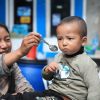
KATHMANDU, Feb 12 (IPS) - Studies have long shown that some women’s lower status in Nepali households could mean that they eat last and less and as a result lack nutrition. Experts are now looking into how this could affect their mental health, and if the growing impacts of climate change might amplify the process.
Hit by Climate Change, Authorities Seek to Improve Saffron Yields in Kashmir
- Inter Press Service

SRINAGAR, India, Feb 07 (IPS) - Saffron, the expensive spice from the Kashmir Himalayas, has been facing challenges for years, mostly related to yields and inadequate irrigation compounded by the climate crisis.
Road to COP29: Highest Climate Ambitions Needed to Decarbonize World
- Inter Press Service

NAIROBI, Feb 05 (IPS) - The road to COP29 has begun in earnest in the backdrop of a global climate report indicating that not only was 2023 the warmest year in a 174-year climate record, it was the warmest by far. Record-breaking temperatures, combined with El Niño, pushed vulnerable and poor nations in the Global South to the frontlines of extreme and severe weather events.
Author and Page Information
- Created:
 Global Issues
Global Issues